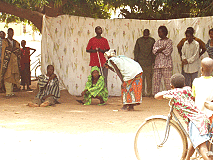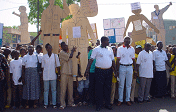Promoting inclusion through drama and art, Burkina Faso
Noëlie Gansoré
In this article Noëlie Gansoré explains how drama was used to help raise community awareness about inclusive education and disabled children’s right to such an education.
Response to the problem
Handicap International’s (HI) inclusive education project in Burkina Faso exists in an environment where negative attitudes towards disabled people have dominated. We were therefore aware that promoting inclusive education would require preliminary awareness raising and information work with all education stakeholders. In our context, these stakeholders include teachers, educational supervisors, artisans in rural areas, parents, and particularly parents of disabled children.
We decided that a play followed by discussions would be an interesting way to reach people who rarely visit school facilities. It would be a good way to convey messages in an accessible and culturally relevant way. Four events were held in the department: in Tanghin-Dassouri for the centre region, in Nimdi for the eastern region, in Dondoulma for the north, and in Koumlèla for the west.
We used the Allah Dari drama company (Allah Dari means “We are looking for God”). The actors – in a funny, efficient and convincing way – showed that disabled children are like other children, have the same right to education, can be as successful, and educating them is a profitable investment for their parents and for society.
Some of the actors were disabled people. One disabled girl in the play was a successful pupil, and now she supports her parents financially, and has set up development facilities in the village (a drill, a mill, etc).
The team was given a warm welcome during the four events. The discussions following the play were intense. The audiences detected the negative attitudes portrayed in the play that need to be changed in order to enable disabled children to be included in education. For instance, the play depicted:
- the ridiculing of disabled children
- refusal to send them to school because people think they are incapable of learning or because they want to marry them off
- parents neglecting children’s education and not supporting them in their studies.
After the professional actors had finished, members of the audience – men, women and young children – took part in role-play activities. They acted out the positive attitudes that they felt some of the characters should have adopted, instead of the negative attitudes the actors had portrayed.
Most of the plays were performed in market places or in other public places. Two thousand people, from all walks of life and of all ages were ultimately involved, including market-goers, people in bars, passers-by, pupils, their parents and their teachers.

Members of the audience role-playing
As a result of these awareness raising activities, we found that we did not need to specifically work on pushing for the enrolment of disabled children at the start of the new 2006/07 school term. The communities now realised that their disabled children could attend schools and the teachers were ready to accept them. Parents voluntarily chose to enrol their children. Since then around 100 ‘new’ disabled children have been identified in the schools of Tanghin-Dassouri, in Grade one or in the transitory classes.1
Global Action Week for Education
In the editorial of “Enabling Education” issue 10, 2006, we discussed the Global Campaign for Education, which focused on the theme of ‘every child needs a teacher’. Here Noëlie talks about HI’s activities in Burkina Faso during the campaign week.
1Transitory classes are for deaf and blind children in rural areas who have never attended school before. The classes teach them basic communication and learning skills in order to be able to participate more successfully in the mainstream classes. Children are in these classes for 2-3 years and interact with their peers at playtimes. HI will soon evaluate the impact and sustainability of these classes.
HI’s inclusive education project wanted to use the Global Action Week to further promote its messages about quality inclusive education. So we supported pupils and teachers from Tanghin-Dassouri to make full-scale figurines and over 300 drawings.
The figurines and drawings represented what the pupils and teachers considered to be ‘the ideal teacher’. They carried messages calling for appropriate approaches to teaching and for better working conditions for teachers, for example:
- “Train our teachers in sign language so that they can teach deaf-mute pupils like us.”
- “An empty sack cannot be put upright.”
- “Decent accommodation and quality schooling.”
- “Our teachers support us in all our activities. Help them give us better supervision.”
On 28 April, the figurines and drawings from Tanghin-Dassouri stood proudly among the ones made by other schools. A crowd of over one thousand pupils, teachers and other key players in the education field marched from the Paspanga schools to the Nation Square in Ouagadougou. They all showed their figurines and drawings to a large crowd of spectators which grew along the way.

The Global Action Week march
The Minister of Basic Education, a delegate of the deputies of the National Assembly, and other traditional personalities attended a ceremony at which they were presented with some of the ‘ideal teacher’ figurines.
HI published an article in a daily newspaper about the inclusion of deaf pupils in Tanghin-Dassouri. In the article a deaf boy – who was included in school – demanding that his out-of-school friends should not be forgotten. This was such a strong message that the radio station also broadcast the story. In response to the broadcast, a local businessman donated food to HI for children involved in its inclusive education project. The deaf boy’s demands helped to reinforce the messages that had been conveyed through the drama and Global Campaign Week activities.
Noëlie is HI’s Disability and Education Adviser for the inclusive education project. She has over 25 years’ experience in research and education. Since 2003, she has also worked as a researcher in the Education Department of the Institute of Social Sciences and in the National Research Centre for Science and Technology.
Contact:
Inclusive Education Project
Handicap International
BP 541
Ouagadougou 01
Burkina Faso
Email: hibfeduc@cenatrin.bf
